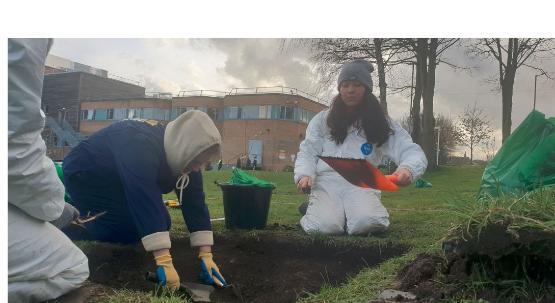Students practice real CSI skills

University of Bradford postgraduate students practised real crime scene investigation skills during a dig on campus.
Students from the MSc in Forensic Archaeology and Crime Scene Investigation programme, were set a task to unearth a series of buried objects, and record their activities using skills commensurate with police CSI practice.
Associate Professor Robert Janaway, a forensic archaeologist with over 35 years experience, who has worked with a number of police forces and delivered training both here and abroad, said: “We run a mixture of simulated crime scene experience days. On this occasion, students were involved in an early excavation to recover a number of buried objects. The techniques they use are the same that would be used in a police investigation, both in terms of recording and recovering material. They also have to carry out and record things like witness statements.
He added: “Students from this course go on to a variety of things - some undertake PhDs, others go on to work as professional archaeologists and the police.”
Student Emily Dobson, who was on the dig, said: “It’s really interesting to be able to get hands-on experience, especially with things we have learned about in the classroom.”
Fellow student Marie-Clare Gilbertson added: “These exercises enable us to gain practical skills and things like that are valuable when you come to apply for a job.”
Chloe-Jade Carr, also on the course, said: "The lecturers make the practicals and content of the lectures so relevant and engaging that the skills I have learned can help me when I apply to become a detective after I have completed my masters."
The MSc in Forensic Archaeology and Crime Scene Investigation is accredited by The Chartered Society of Forensic Sciences.
